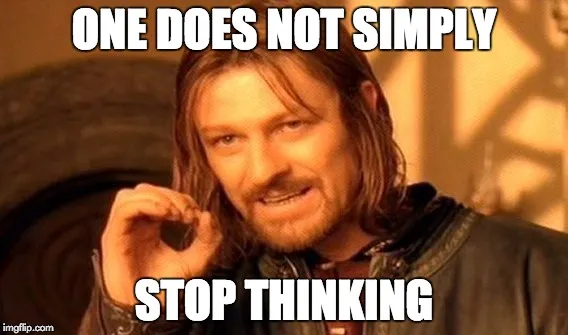Ever been curious about meditation, but think that it's too hard? I hear a lot of people say that "they can't meditate", or that they think meditation is hard.
A lot of people have the (very common) misconception that to meditate you have to clear your mind or stop thinking.
So let me make something clear:

Also, the purpose of meditation is not to stop thinking. Getting distracted by thoughts can actually help you meditate. Let me explain.
Ok, then what is the purpose of meditation?
This is a complicated question and the answer might differ depending on which practice you follow. But all practices of meditation seem to have one common denominator you could call its goal: to become more aware — of your surroundings, your thoughts, your feelings, of everything. This is called mindfulness.
Note that I say more aware, not perfectly aware. If you set out to become perfect you're going to have a hard time. You wouldn't start practicing playing guitar with the intention to become perfect at it. You start practicing to become better at it, and each time you practice you'll increase your skill a little bit more.
Meditation is much the same. It's practice — an exercise for the mind. You're allowed to make mistakes, get distracted, feel uncomfortable.
Exercise doesn't always feel good
A colleague once told me: "I'd like to meditate, but I don't have the patience". The only reply I could come up with was "I'd like to go to the gym, but I don't have the stamina". Both statements are equally ridiculous.
Everybody knows physical exercise is good for you. It keeps you healthy, it increases your strength and/or stamina and it makes your body feel good. But when you're on the threadmill it doesn't always feel so good. Does that mean you're doing it wrong?

Source: oh come on, don't pretend you never heard of Garfield
Not at all. You're expanding the limits of what your body can handle. The first time you run you might not last long, but by exercising regularly you'll find you can keep going for longer and longer.
Meditation is an exercise for the mind. At first you'll get lost in thoughts and get distracted. It's very much the same as your body getting tired from exercise. It means you're growing aware of the current state of your mind, and hands you an opportunity to expand its limits.
The distraction paradox
In meditation every time you notice you're distracted, you're actually not distracted anymore. You're now aware that you were distracted. So to notice your distraction you have to actually become distracted, otherwise there is nothing to notice. This seems like a paradox, but it's true nonetheless.
Every time you notice you're distracted you're actually improving. You're not doing it wrong at all, you're doing it right! Pat yourself on the back for that.
And then?
There are a lot of beneficial side effects from meditation, many of which have been confirmed by scientific research. I won't go over all of them in this post, but among the reports have been reduced levels of stress and anxiety, feeling more love for yourself and/or others, and yes, a clearer mind. Clearing your mind is not a goal of meditation but a long-term side effect, much like feeling physically fit is not the direct goal of running on a threadmill.

Source: David Sipress
So give it a shot. Sit down, meditate for a few minutes without the goal of being perfect, and see how you get distracted. Every time you get distracted, remind yourself you're not doing it wrong. You're simply exercising. You're learning! So be kind to yourself :)
Instructions
My favorite meditation instructions are from Sam Harris - they're very simple (and don't even require you to be a Buddhist or anything at all)
- Sit comfortably, with your spine erect, either in chair or cross-legged on a cushion.
- Close your eyes, take a few deep breaths, and feel the points of contact between your body and the chair or floor. Notice the sensations associated with sitting—feelings of pressure, warmth, tingling, vibration, etc.
- Gradually become aware of the process of breathing. Pay attention to wherever you feel the breath most clearly—either at the nostrils, or in the rising and falling your abdomen.
- Allow your attention to rest in the mere sensation of breathing. (There is no need to control your breath. Just let it come and go naturally.)
- Every time your mind wanders in thought, gently return it to the sensation of breathing.
- As you focus on the breath, you will notice that other perceptions and sensations continue to appear: sounds, feelings in the body, emotions, etc. Simply notice these phenomena as they emerge in the field of awareness, and then return to the sensation of breathing.
- The moment you observe that you have been lost in thought, notice the present thought itself as an object of consciousness. Then return your attention to the breath—or to whatever sounds or sensations arise in the next moment.
- Continue in this way until you can merely witness all objects of consciousness—sights, sounds, sensations, emotions, and even thoughts themselves—as they arise and pass away.
Source: How to Meditate. It also includes a link to these instructions in audio form, as a guided meditation.
Have you tried it?
Let me know how it went! Is it easier now that you know there's really no way to do it wrong?